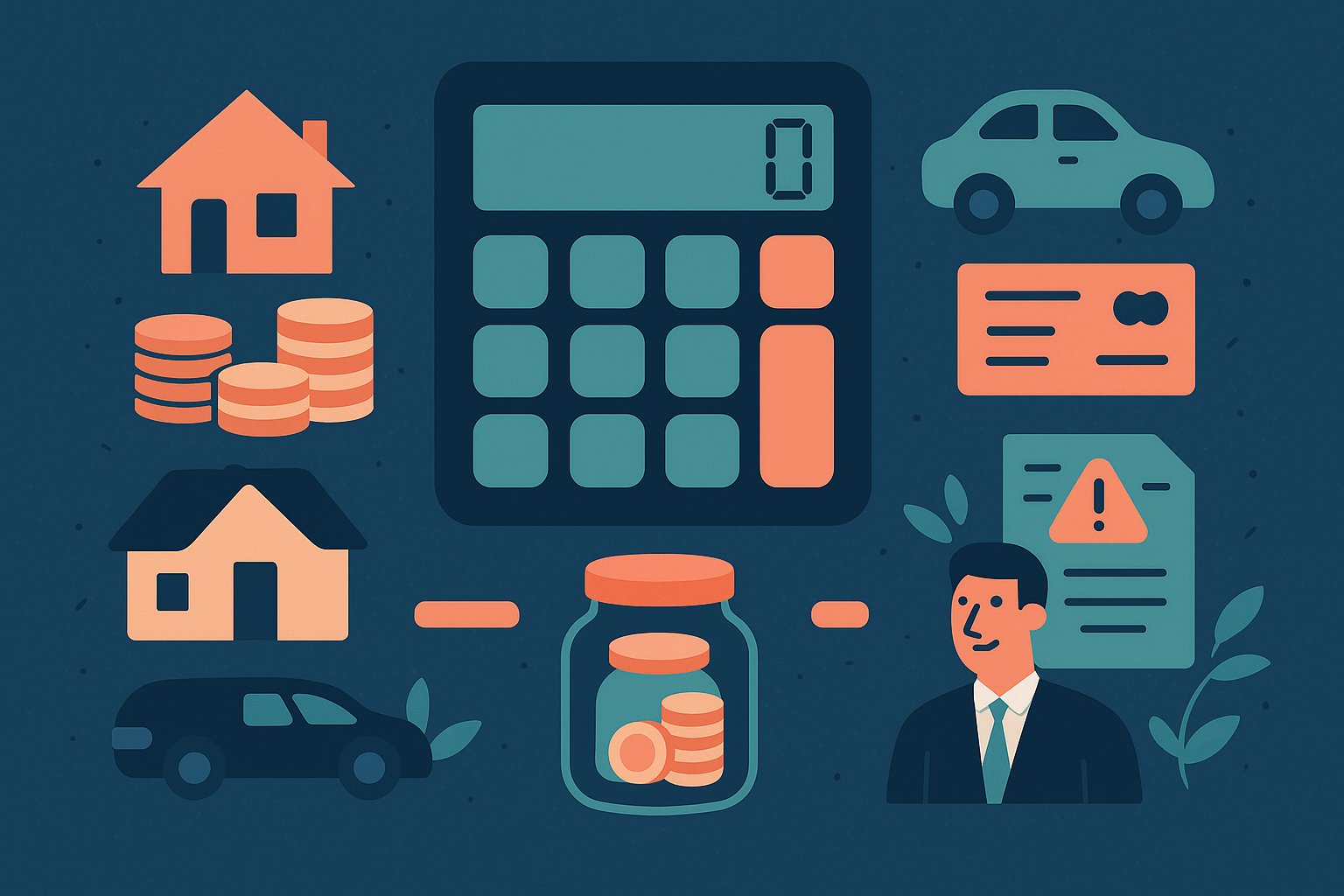Unlocking the Story Behind Your Numbers
Calculating your net worth is more than an exercise in arithmetic—it’s a revealing snapshot of your financial journey. Whether you’re dreaming of early retirement, planning a major purchase, or simply curious about where you stand, understanding your net worth provides clarity and confidence. At its core, net worth represents the difference between everything you own and everything you owe. But beneath that simple formula lies a narrative of past decisions, present realities, and future possibilities. By taking the time to gather accurate information, assign realistic values, and track changes over time, you transform a static number into a dynamic roadmap for financial success. In this comprehensive guide, you’ll learn not only how to calculate your net worth with precision but also how to interpret the results, set meaningful goals, and harness this insight to fuel smarter money moves. Let’s embark on this journey and discover the true power of knowing your net worth.
Defining Net Worth: Your Personal Balance Sheet
At its essence, your net worth is a personal balance sheet. Assets—the things you own—sit on one side, while liabilities—the debts you owe—occupy the other. Subtract liabilities from assets, and the remainder is your net worth. This figure can be positive, indicating that you own more than you owe, or negative, signaling debts outweigh your holdings. Assets range from cash in a savings account and the market value of investments to the equity in your home and even the estimated resale value of your car. Liabilities include credit card balances, car loans, student loans, mortgage debt, and any outstanding personal loans. By viewing your finances through this structured lens, you gain a clearer perspective on your true financial position—one that extends beyond paycheck amounts and monthly budgets to reveal the net effect of every saving decision and borrowing choice you’ve ever made.
Gathering Your Financial Data: Accuracy Is Key
Before you can calculate your net worth, you need a comprehensive inventory of your assets and liabilities. Start by compiling recent statements for bank accounts, investment portfolios, retirement accounts, and any other financial holdings. Don’t forget tangible assets like real estate, vehicles, collectibles, or jewelry. For liabilities, gather credit card statements, loan documents, and any records of outstanding bills or payment plans. Accuracy here is essential: underestimating debts or overestimating asset values will skew your net worth calculation and hamper informed decision-making. If a statement isn’t readily available, reach out to your financial institution or use secure online portals. Once you’ve assembled all the numbers in one place—whether on paper, in a spreadsheet, or within a personal finance app—you’re poised to move on to the next step: valuing each item correctly.
Valuing Your Assets: More Than Just a Guess
Determining realistic values for your assets keeps your net worth calculation grounded in reality. For cash and market-traded investments, use current balances and closing prices from your most recent statements. For real estate, consider a recent appraisal or comparative market analysis to estimate current market value. Vehicles can be valued using trusted guides or online valuation tools that account for make, model, year, mileage, and condition. Items like collectibles and jewelry may require professional appraisal or market research to establish fair resale value. Remember, the goal is not to inflate your net worth but to arrive at a credible estimate that reflects what you could reasonably obtain if you liquidated that asset today. If you’re uncertain, err on the conservative side. This disciplined approach prevents surprises down the road and builds a solid foundation for financial planning.
Accounting for Liabilities: Facing What You Owe
While assets showcase your holdings, liabilities paint a picture of your obligations. For each debt, note the current balance rather than the original amount borrowed. Credit card statements will show exact balances, while loan servicers provide detailed payoff figures. Don’t overlook smaller recurring obligations, such as medical bills, tax liabilities, or outstanding utility balances. Student loans and mortgages often allow you to request a payoff statement directly from the lender. By totaling all these liabilities, you obtain a clear sense of the debt you carry. A thorough inventory of liabilities ensures your net worth calculation accurately reflects the full spectrum of your financial commitments, setting the stage for mindful debt management and strategic paydown plans.
Calculating Your Net Worth: The Simple Formula
With all your data in hand, calculating net worth is straightforward. Sum the values of all assets, then sum the values of all liabilities. Subtract the total liabilities from the total assets, and the difference is your net worth. For example, if you have $150,000 in assets and $90,000 in liabilities, your net worth is $60,000. This single figure condenses complex financial details into an at-a-glance metric of your economic health. Beyond the arithmetic, the act of calculation fosters a deeper awareness of where your money is tied up—whether in investments, home equity, or high-interest debt—and highlights areas for potential improvement.
Interpreting Your Net Worth: Context Matters
A net worth figure, by itself, lacks context. A $50,000 net worth might feel modest for a 50-year-old professional, but impressive for a recent graduate. To gauge progress, compare your net worth against industry benchmarks, age-based averages, or your own goals. Tracking net worth quarterly or annually reveals trends: is your net worth climbing steadily, plateauing, or dipping? A growing net worth signals successful saving and investing strategies, while a declining number could point to overspending, market downturns, or rising debt. Use these insights to celebrate wins—like paying down a major loan—or to identify areas needing attention, such as reducing high-interest credit card debt. Remember, net worth is a dynamic measure; fluctuations are normal, especially when markets move. What matters most is the overall trajectory over time.
Setting Goals to Improve Your Net Worth
Once you know your net worth, translate that knowledge into action. Set specific, measurable goals—such as increasing net worth by 10% in one year, eliminating a $5,000 credit card balance within six months, or boosting retirement savings by a fixed amount each month. Align these objectives with your broader life plans, whether buying a home, funding education, or retiring early. Break down large goals into manageable milestones, and integrate them into your monthly budget or financial plan. As you make progress—perhaps by automating monthly contributions to investment accounts or negotiating lower interest rates—you’ll see direct improvements in your net worth calculation. This goal-oriented approach transforms passive awareness into proactive growth.
Tracking Progress: Tools and Techniques
Maintaining an accurate, up-to-date net worth statement is easier than ever. Personal finance software and mobile apps can automatically import account balances and debt figures, updating your net worth in real time. Spreadsheets offer customizable templates for those who prefer hands-on control. Some investors even use calendar reminders to update valuations each quarter. Whichever method you choose, consistency is key. Regular tracking allows you to spot trends, detect errors, and celebrate milestones. It also takes the guesswork out of year-end tax planning and retirement readiness assessments. By making net worth tracking a routine habit, you keep a pulse on your financial health and stay motivated to pursue your goals.
Leveraging Net Worth for Broader Financial Planning
Net worth is not an end in itself, but a crucial input for comprehensive financial planning. With a clear understanding of your net worth, you can make informed decisions about risk tolerance, asset allocation, and debt management. Financial advisors often use net worth as a starting point for retirement projections, insurance needs analysis, and estate planning. Entrepreneurs may leverage net worth to secure loans or attract investors, while individuals planning large purchases—such as a home or vehicle—use net worth to determine a safe debt level. By integrating your net worth figure into broader strategies, you ensure that each financial decision aligns with your long-term objectives and current resources.
Empowering Your Financial Future
Calculating your net worth is a transformative exercise that unlocks valuable insights into your financial past, present, and future. By carefully cataloging assets and liabilities, assigning realistic values, and regularly tracking changes, you gain a powerful tool for goal setting, decision making, and overall financial empowerment. Whether you’re navigating debt repayment, planning for retirement, or simply seeking clarity, a well-maintained net worth statement offers both perspective and direction. Embrace this practice as part of your ongoing money management routine, and let your net worth guide you toward greater confidence, security, and prosperity. Your financial story is written in numbers—now you have the means to read it clearly and chart a course toward your brightest goals.




